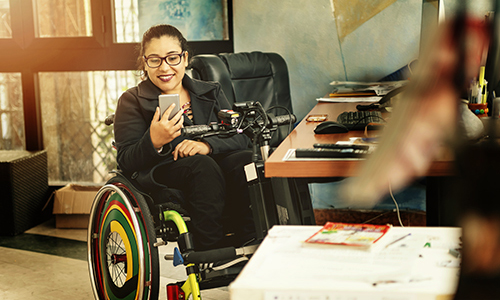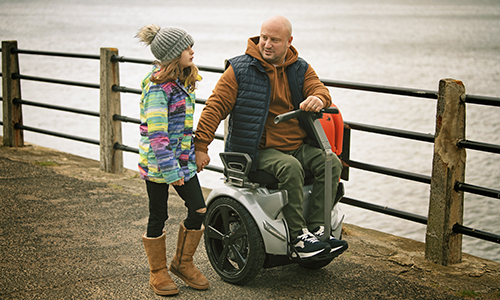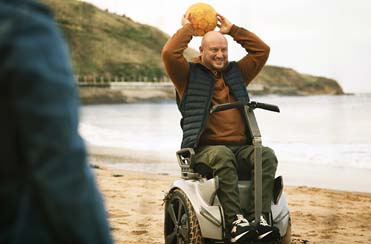Working after experiencing a spinal cord injury can be a great way to maintain self-esteem, achieve goals, and stay active. To give yourself the best chance at employment, it helps to be familiar with laws and programs designed to assist those with disabilities like yours.
For survivors of spinal cord injury, the ability to return to work is important in many ways. Not only does it provide income, health insurance, and other benefits, it gives one a sense of self-esteem, sense of belonging, and overall life satisfaction. The challenge, however, is most people with an SCI need some form of support, training, or vocational rehabilitation to secure employment opportunities.
Here, we outline a few things people with an SCI should know as they pursue work after spinal cord injury.
The first thing to remember is that the law is on your side. Passed in 1990 and amended in 2008, the Americans with Disabilities Act (also called ADA) prohibits employers from discriminating against individuals who are able to perform essential functions of a job, with or without accommodation.
A few things to know with regards to ADA protections:
· To be protected, you must have a disability that limits major life activities
· Employers must make reasonable accommodations to your disability if it would not impose an undue hardship on the business
· When you apply for a job, an employer cannot ask you about the existence, nature, or severity of your disability – only about your ability to perform certain job functions
· An employer can require you to pass a medical examination only if it is job-related and required of all employees in similar jobs
· If you feel an employer has discriminated against you, you may have recourse through the office of the U.S. Equal Employment Opportunity Commission
Another law, which focuses on younger individuals with disabilities, is the Individuals with Disabilities Education Act (IDEA). Designed to assist those who have not yet finished their K-12 education, it provides services they need to meet their academic and vocational goals to ensure a smooth transition to adult life. Students eligible under this law may remain in school until they are age 22, should the extra time be necessary to achieve their goals.
As is often the case with those who suffer spinal cord injury, the job you may have had before the injury may not be one you are able to perform after. Or, at the very least, you may not be able to perform it in the same way. In these instances, the ability to participate in a vocational rehabilitation program can be a difference-maker.
Through these programs, a wide range of services are available to help people identify their career interests and skills; acquire the relevant education or training to find and apply for jobs; and get work accommodations. The good news is most are paid for by private insurance companies, federally funded programs, state workers’ compensation programs for those injured while on the job, or Veterans Affairs.
Fortunately, for those with an SCI, vocational rehabilitation can take place at any time an individual needs help in finding or keeping employment. If you are not working but ready and wanting to work, or if you are working but dissatisfied with your current job, vocational rehabilitation may be right for you.
While no two vocational rehabilitation programs are exactly the same, you can expect the process for each to contain the following elements, practices, and procedures:
Program referral – getting started on a vocational program typically entails a discussion with your rehabilitation medical professional, who can refer you to a vocational program counselor. These are people with advanced degrees, trained to help people with disabilities find employment.
Assessment – successful vocational rehabilitation begins with your counselor helping you evaluate your interests, skills, limitations, health needs, work and education histories, and even personality in order to match these interests and needs with characteristics and demands of specific types of jobs. In this assessment phase, you can expect your counselor to administer some combination of interviews, questionnaires, medical information requests, and sometimes aptitude and skills tests.
Real-life “tests” – performing any job even without a disability is not always a sure thing for either employee or employer. One benefit to many vocational rehabilitation programs is that they may offer a trial period to ascertain whether you are able to perform the duties the job requires, if you like the job, and what, if any, accommodations you may need.
Job market assessment – the job market is always fluid. Jobs and skills with which you may have been the perfect match previously, may not be the case today. Your vocational rehabilitation counselor can help you assess opportunities in your area that best match your skills and interests – not to mention wage requirements and necessary education.
Setting goals – of course, the end product of the rehabilitation counseling process is deciding on the specific career or occupation you want to pursue. And while this may be your long-term goal, do understand there may be intermediate steps along the way. These steps, and this journey, should be described in detail as part of a written plan you and your counselor create together.
Landing a job – after all the thorough planning and preparation have been done, it’s time to secure a job. Now, at this point, many people with an SCI secure employment completely on their own. But one should not hesitate to lean on the knowledge and experience of a vocational rehabilitation counselor, who can help determine through job analysis, if the tasks that will be expected of you and the social and physical expectations the job requires match with your desires and capabilities.
Once you have secured employment, there are things you should always remember, as someone with an SCI. Many of these have to do with accommodations.
Your disability may require ongoing support and assistance from your workplace in order to perform your job effectively. Some of these may include the modifying of work schedules, tasks, or the work environment itself: removing a desk drawer or raising the height of your desk to accommodate a wheelchair; special software and hardware for those who have limited hand function; a private changing area for those with occasional bladder control issues. These are all accommodations that are well within your rights to request as long as they do not constitute undue hardship for your employer.
Unfortunately, there will be some people with an SCI for whom work is just not possible. It could be someone who lives in a rural area where employment opportunities do not exist. Maybe you are an older worker unable to transfer your pre-injury skills to a new occupation. The important thing to remember is that there are services and programs that may be available to assist you.
Social Security Disability Insurance (SSDI) is a long-term disability program based on your past work history and income. Supplemental Security Income (SSI) is a federal program designed to help those unable to work who are low income. A conversation with your rehabilitation team and/or vocational rehabilitation counselor can help determine which you may qualify for.









